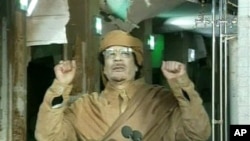A former diplomat and interpreter for Libya’s embattled President Moammar Gadhafi says there are few solutions to ending the ongoing clashes between anti-government protesters, who demand he step down, and pro-Gaddafi supporters.
Abubaker Saad, professor of history and non-Western cultures at Western Connecticut State University in the United States, says Gadhafi’s public pronouncements, in his words, depict his unwillingness to negotiate with the anti-government protesters to end the crisis.
“After 42 years of his rule, and then you have the popular uprising in neighboring Tunisia and Egypt, you would think that he will learn a lesson from them and he will offer to compromise, or negotiate, or open a dialogue or something like that. But, we know that he is not going to do that and now the rest of the world knows,” said Saad.
“If you are the leader and you do not offer any compromise, or even accept the idea of sitting down and having a dialogue, the only alternative is to get rid of him," he said.
In a Thursday speech relayed to state television by telephone, Gadhafi blamed Osama bin Laden and al-Qaida terrorists for the anti-government protests in his country. This came as violence continued between fighters loyal to Mr. Gadhafi and anti-regime forces.
Witnesses say the fighting Thursday took place about 200 kilometers east of the capital, Tripoli, in the city of Misrata where anti-government forces Wednesday claims to have taken control of the country's third largest city.
Another clash broke out Thursday just west of the capital in the city of Zawiya.
Saad says Gadhafi’s firm grip on Libya’s oil wealth has been weakened by the takeover of the oil-producing areas by anti-government protesters.
“His force is concentrated in the capital city,Tripoli, which has close to 2 million people and that is where really the (worst) bloodshed is going to happen because the protesters, after 42 years, are not going to go back; they are not going to even negotiate with him anymore because they don’t trust him,” said Saab.
“Gadhafi’s power was basically built on his oil money. Now, most of the oil-producing areas have been liberated from Gadhafi. Tripoli itself as a city really doesn’t have the financial power to sustain him for too long, and that is why he is ordering his supporters to strike now because the areas that have been liberated are going to besiege him.”
Meanwhile, President Barack Obama said Wednesday the violent crackdown in Libya violates international norms and that he has ordered his national security team to prepare "a full range of options" for dealing with the crisis.
Obama said it is "imperative the nations of the world speak with one voice" about the brutal response carried out by militiamen and Gadhafi supporters against civilians.
The president, in his first public comments on the turmoil in Libya, called the suffering and bloodshed “outrageous and unacceptable.” Obama said universal human rights are non-negotiable and "must be adhered to.”
